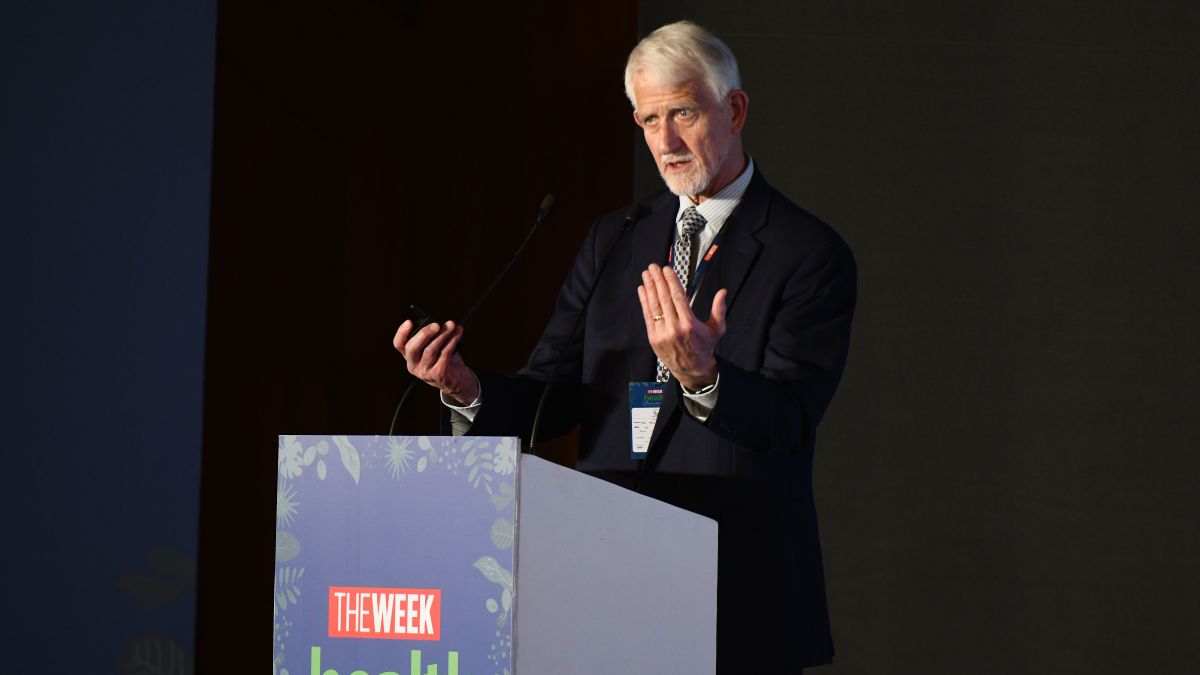THE WEEK Health Summit 2025 | Can breast cancer be prevented with a vaccine? Cleveland Clinic reveals stunning progress
 Dr George Thomas Budd, principal investigator of the Cleveland Clinic’s breast cancer vaccine programme, speaks at THE WEEK Health Summit 2025, New Delhi | Sanjay Ahlawat
Dr George Thomas Budd, principal investigator of the Cleveland Clinic’s breast cancer vaccine programme, speaks at THE WEEK Health Summit 2025, New Delhi | Sanjay Ahlawat
At THE WEEK Health Summit 2025, a quiet but potentially revolutionary idea took center stage: a future where breast cancer could be prevented not only by screening and early diagnosis, but by a vaccine.
Dr Jame Abraham, the India-born Chair of Hematology and Medical Oncology at the Cleveland Clinic, set the context bluntly. “Research is crucial for healthcare,” he said. “We at Cleveland are proudly leading several cancer trials.” Among them is one of the most closely watched studies in the world today, a breast cancer prevention vaccine trial.
Spearheading this groundbreaking work is Dr George Thomas Budd, principal investigator of the Cleveland Clinic’s breast cancer vaccine programme. He explained that science has reached a point where immunotherapy, once considered a last-resort treatment for advanced cancers, is now being adapted into preventive tools. “Immunotherapy is the latest therapy used in treating breast cancer,” Dr Budd noted. “Now we are exploring how the same immune principles can stop the disease from developing in the first place.”
The inspiration, in part, came from an unlikely source: Covid-19. The pandemic demonstrated that vaccines, even novel, highly targeted ones, can be developed at unprecedented speed. “Covid-19 tells us vaccines can be made quickly,” Dr Abraham said. “That opens a new horizon for cancer.”
At the heart of the Cleveland Clinic trial is alpha-lactalbumin, a protein normally present only during lactation. It becomes abnormally expressed in many breast cancers, especially triple-negative breast cancer (TNBC), an aggressive form that affects younger women and has poorer outcomes. “Alpha-lactalbumin meets all the criteria for a breast cancer vaccine,” Dr Budd explained. The idea is to train the immune system to recognize and eliminate cells producing this protein before they can turn malignant."
The trials underway include two major components:
1. A randomised trial to add the vaccine to pre-operative chemotherapy and immunotherapy regimens, testing whether it boosts response.
2. A post-operative approach, combining the vaccine with pembrolizumab in patients who still have residual disease after neoadjuvant chemotherapy.
What this means for India
For Indian women, the implications are profound. Breast cancer is the most common cancer among women in the country, and India also bears the world’s highest burden of cervical cancer, both diseases where vaccination could be transformative. “Cervical cancer is the second most common cancer in Indian women after breast cancer,” Dr Budd reminded. “And that is just the tip of the iceberg. Earlier vaccination is better to immunize before exposure.”
A breast cancer vaccine, if proven safe and effective, could be a lifeline for India’s vast population of women who lack access to regular screening, early diagnosis, or timely treatment. It could also reshape preventive healthcare, moving women away from a cycle of late-stage presentation toward true disease interception.
For millions of Indian families for whom a cancer diagnosis brings financial catastrophe, social stigma, and emotional devastation, a preventive vaccine is more than a medical breakthrough; it is hope, injected before disease ever takes root.
Health